Unit3 Build up vocabulary and discover useful structure 课件人教版 选择性必修二
文档属性
| 名称 | Unit3 Build up vocabulary and discover useful structure 课件人教版 选择性必修二 |  | |
| 格式 | pptx | ||
| 文件大小 | 75.3MB | ||
| 资源类型 | 试卷 | ||
| 版本资源 | 人教版(2019) | ||
| 科目 | 英语 | ||
| 更新时间 | 2024-12-10 09:23:16 | ||
图片预览

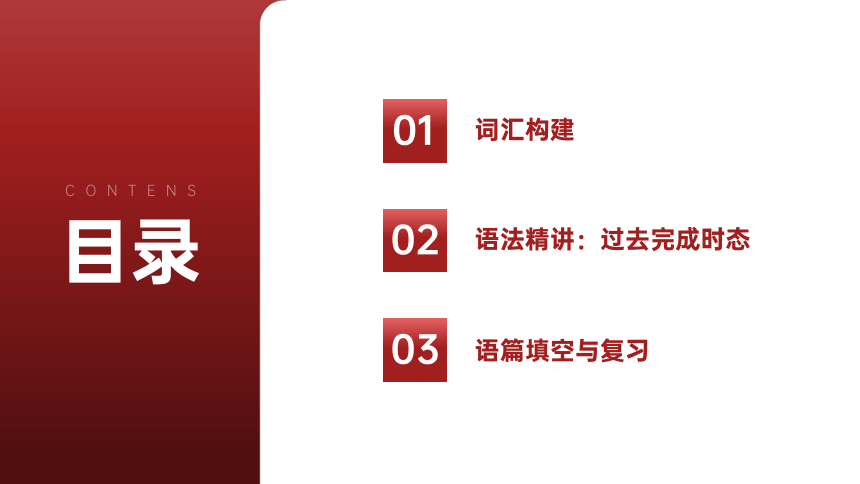
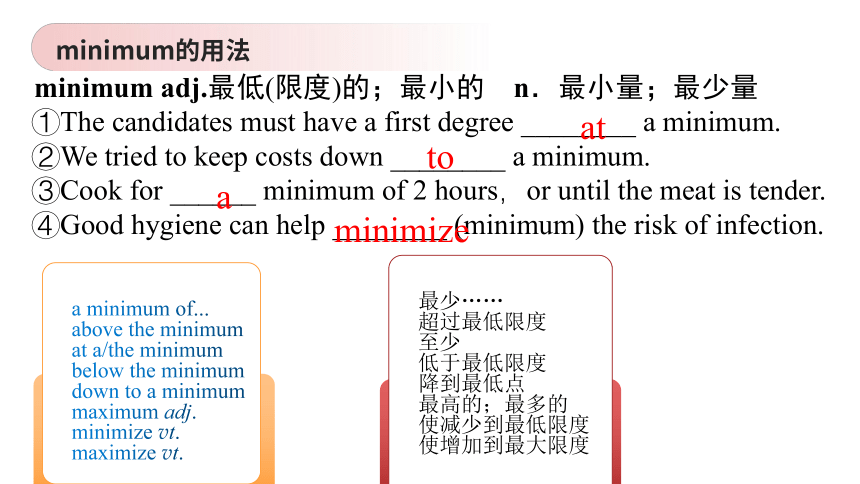
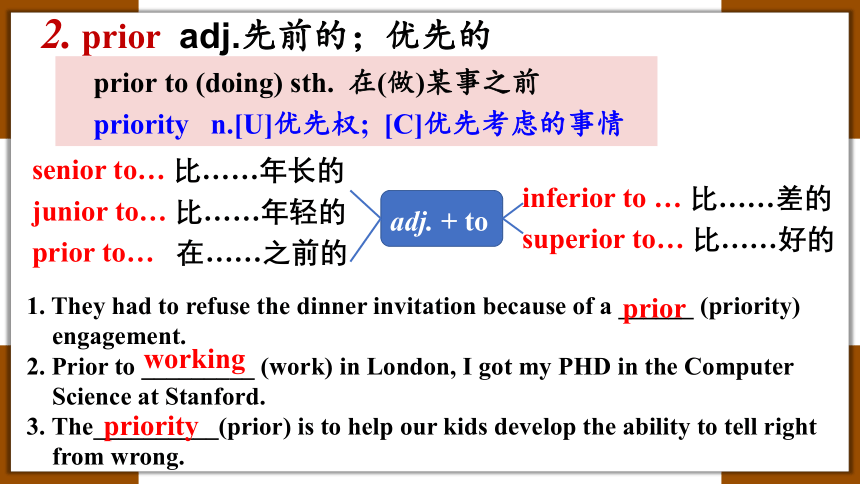
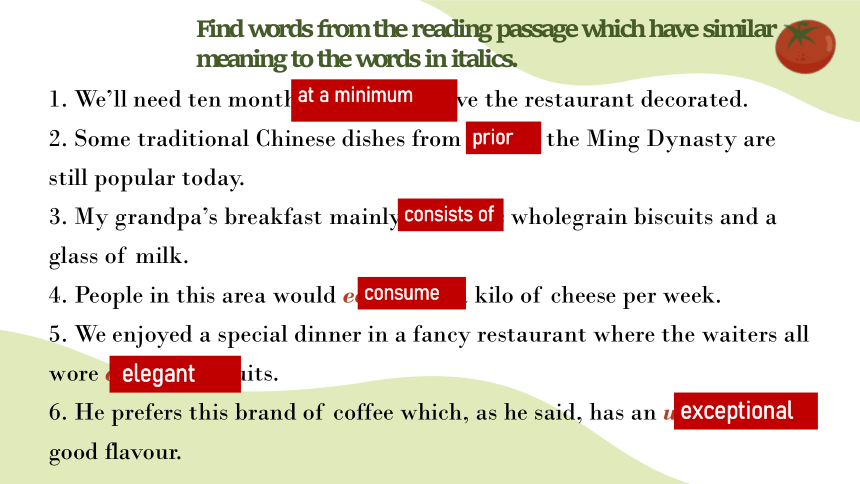
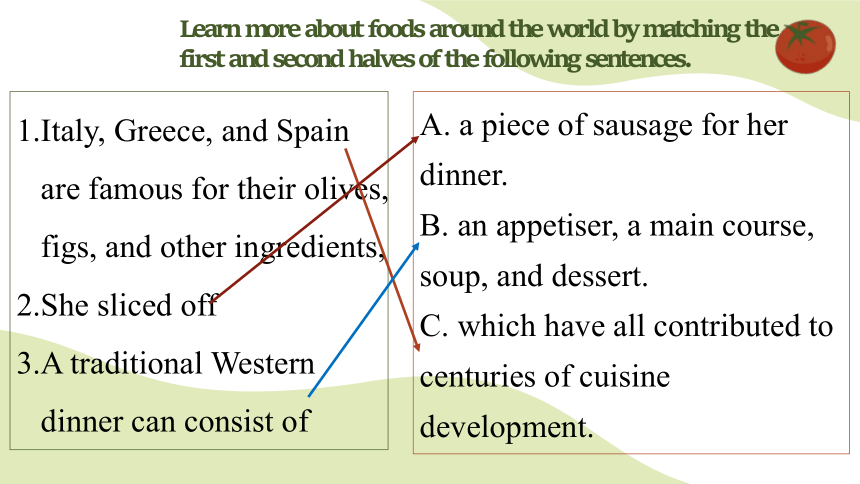
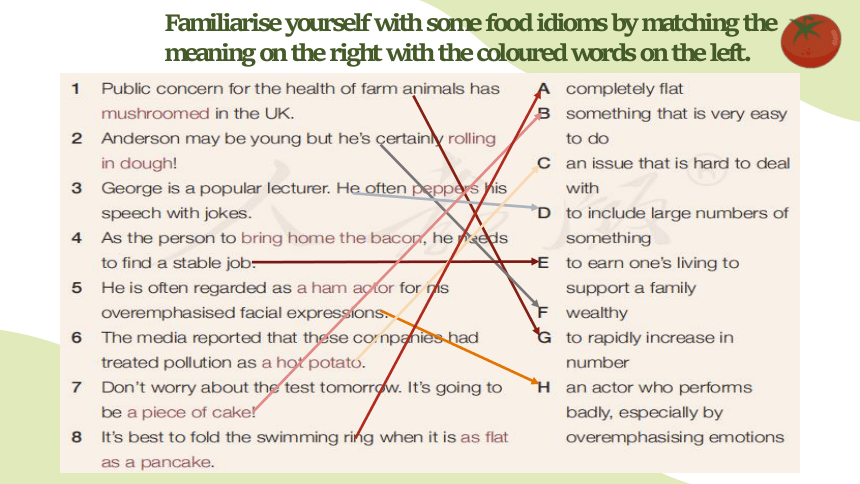
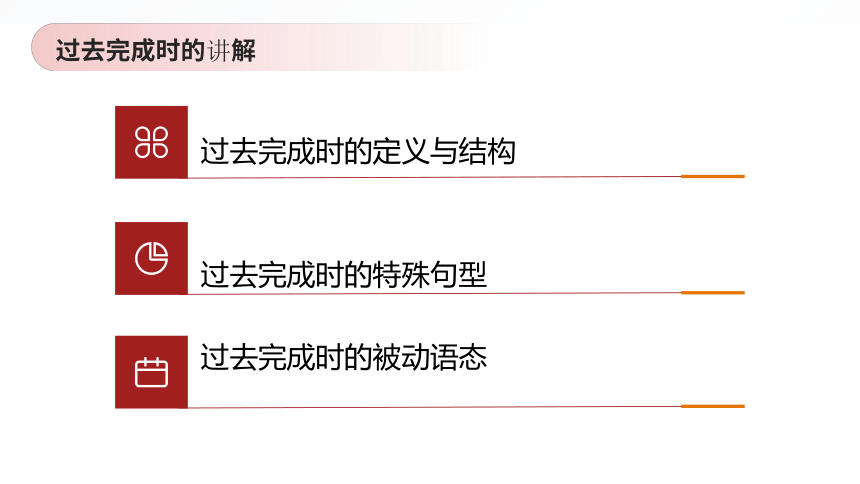

文档简介
(共23张PPT)
Unit 3 Food and culture
汇报人:爱设计
目录
CONTENS
01
02
03
词汇构建
语法精讲:过去完成时态
语篇填空与复习
minimum的用法
minimum adj.最低(限度)的;最小的 n.最小量;最少量
①The candidates must have a first degree ________ a minimum.
②We tried to keep costs down ________ a minimum.
③Cook for ______ minimum of 2 hours,or until the meat is tender.
④Good hygiene can help ________ (minimum) the risk of infection.
at
to
a
minimize
a minimum of...
above the minimum
at a/the minimum
below the minimum
down to a minimum
maximum adj.
minimize vt.
maximize vt.
最少……
超过最低限度
至少
低于最低限度
降到最低点
最高的;最多的
使减少到最低限度
使增加到最大限度
2. prior adj.先前的;优先的
adj. + to
senior to… 比……年长的
junior to… 比……年轻的
prior to… 在……之前的
inferior to … 比……差的
superior to… 比……好的
prior to (doing) sth. 在(做)某事之前
priority n.[U]优先权; [C]优先考虑的事情
1. They had to refuse the dinner invitation because of a ______ (priority) engagement.
2. Prior to _________ (work) in London, I got my PHD in the Computer Science at Stanford.
3. The__________(prior) is to help our kids develop the ability to tell right from wrong.
prior
priority
working
Find words from the reading passage which have similar meaning to the words in italics.
1. We’ll need ten months at least to have the restaurant decorated.
2. Some traditional Chinese dishes from before the Ming Dynasty are still popular today.
3. My grandpa’s breakfast mainly includes wholegrain biscuits and a glass of milk.
4. People in this area would eat nearly a kilo of cheese per week.
5. We enjoyed a special dinner in a fancy restaurant where the waiters all wore attractive suits.
6. He prefers this brand of coffee which, as he said, has an unusually good flavour.
at a minimum
prior to
consists of
consume
elegant
exceptional
Learn more about foods around the world by matching the first and second halves of the following sentences.
Italy, Greece, and Spain are famous for their olives, figs, and other ingredients,
She sliced off
A traditional Western dinner can consist of
A. a piece of sausage for her dinner.
B. an appetiser, a main course, soup, and dessert.
C. which have all contributed to centuries of cuisine development.
Familiarise yourself with some food idioms by matching the meaning on the right with the coloured words on the left.
过去完成时的讲解
过去完成时的定义与结构
过去完成时的特殊句型
过去完成时的被动语态
一、过去完成时的定义与结构
1. I realized I _________ (rinse) my mouth with aftershave instead of mouthwash.
2. After I _________ (wait)for a few minutes, I realized I had put my shirt on
inside out.
过去完成时表示在过去某一时间或事件之前已经完成的动作
或已经存在的状态。
had rinsed
had waited
Past
Future
Present
“过去的过去”
had done
诵读下列例句并感知加黑部分的共性
(1)[P26 教材原文] Prior to coming to China, my only experience with Chinese cooking was in America, with Chinese food that had been changed to suit American tastes.
(2)[P26 教材原文] When my family and I had just arrived in China, we went looking for a good place to eat in Beijing.
(3)[P26 教材原文] A Sichuan restaurant had been recommended to us by a friend, and finally, we found it.
(4)[P26 教材原文] Tired, hungry, and not knowing a word of Chinese, we had no idea how to order, so the chef just began filling our table with the best food we had ever eaten.
1.所有加黑部分都属于 。
2.句(2)(4)是过去完成时的 语态。3.句(1)(3)是过去完成时的 语态。
过去完成时
主动
被动
Leading-in
过去完成时基本结构:
(1)肯定:主语+had done
(2)否定:主语+had not done
(3)疑问:Had+主语+ done
疑问词+had+主语+ done肯定回答:Yes,主语+had.
否定回答:No,主语+hadn't.
(4)特殊疑问句:特殊疑问词或词组+had+主语+done+其他?
(5)被动语态:主语+had (not)+been+done+其他
一、过去完成时的定义与结构
1. Scarcely had the votes been counted, when the telephone rang.
2. No sooner had I walked out than I remembered that I forgot my homework.
3. Hardly had we sat down to supper when the phone rang.
What are the meanings and features of the following sentences
(3)常用固定句型:(刚……就……)
Hardly / Scarcely ... when ;No sooner ... than否定词置于句首,需要部分倒装。主句用过去完成时,从句用一般过去时。
二、过去完成时的特殊句式
1. 我刚到车站,火车就开了。(scarcely ... when ...)
即学即练
Hardly had the result been announced when the crowd applauded.
The result had hardly been announced when the crowd applauded.
I had scarcely reached the station when the train started.
2. 结果刚一宣布,人们就欢呼起来。(hardly ... when ...)
/Scarcely had I reached the station when the train started.
1. It was the first time she _________ (leave) her motherland.
2. It is the first time (that) I _____________ (speak) in public.
3. This _____ (be) the first time I had seen Dad so furious (狂怒的).
4. It is time for us ________ (pack) up and leave.
had left
have spoken
was
(5)It / This / That was the first / second ... time (+ that) sb had
done sth …
It / This / That is the first / second ... time (+ that) sb had
这是 / 那是某人第一 / 第二次 / 第……次做……
to pack
It is high / about time that we ______________ (do) something to stop pollution.
did / should do
It is high / about time that sb did / should do sth
是该做……的时候了 (should 不可省略)
三、过去完成时的被动语态
1. The work _______________(finish)by us by nine o ’clock yesterday.
2. Grace realized a mistake _____________ (make) by her.
3. The project _________________(complete) by the end of 1999.
had been finished
had been made
had been completed
过去完成时被动结构:
had (not) been done
1.The boy didn't remember whether his homework ________________ (hand) in.
2.The media reported more than 1,000 people (kill) in the earthquake.
3.I was very sad at his death.We (be) good friends since our childhood.
4.She (work) on the farm for three years before she became a teacher.
5.When I got to school, I realised I (leave) my bag at home.
6.Helen said that she (move)to another flat.
had been handed
had been killed
had been
had worked
had left
had moved
Had
tasted/eaten
had been told
arrived
had finished
had eaten
Had been
cancelled
had got
翻译句子。
1) 到上个月底为止,我已经学了四千个单词。
2) 他做完作业后,出去踢足球了。
3) 我回到家时,她已经锁了门。
4) Jim于2019年去世的。
5) 上周五他非常忙。
I had learned 4,000 words by the end of last month.
After he had done his homework, he went out to play football.
By the time / When I got home, she had locked the door.
Jim died in 2019.
He was very busy last Friday.
Last year, my brother and I _____ (go) to Miami for a vacation. Some of my friends who _________ (be) there before said it was a wonderful holiday destination. Before we went, we ____________ (plan) for months. When the day came, we were ready.
had been
had planned
went
语篇填空
After our plane _______ (land), we went to the hotel. We __________ (make) our reservation six months earlier, but the man at the front desk said there _________ (be) a mistake. We _________ (tell) that our rooms hadn’t been reserved for that week, but for the week after. I didn’t understand why this would happen and my credit card _______________ (charge) for the reservation.
landed
had made
had been
were told
had been charged
What’s worse, the hotel _________________ (book) fully. When we ______________ (wonder) what to do, the manager came out. She was surprisingly helpful. She apologized for the mistake and ______ (give) us a spare VIP room on the top floor. We had never stayed in such an amazing room, and we _______________ (charge) extra.
were wondering
gave
weren’t charged
had been booked
The next day, my brother and I went to the beach where we ________ (watch) some people play volleyball. We got a little sunburnt, but the day __________ (be) so relaxing that we didn’t mind.
watched
was
语篇填空
Unit 3 Food and culture
汇报人:爱设计
目录
CONTENS
01
02
03
词汇构建
语法精讲:过去完成时态
语篇填空与复习
minimum的用法
minimum adj.最低(限度)的;最小的 n.最小量;最少量
①The candidates must have a first degree ________ a minimum.
②We tried to keep costs down ________ a minimum.
③Cook for ______ minimum of 2 hours,or until the meat is tender.
④Good hygiene can help ________ (minimum) the risk of infection.
at
to
a
minimize
a minimum of...
above the minimum
at a/the minimum
below the minimum
down to a minimum
maximum adj.
minimize vt.
maximize vt.
最少……
超过最低限度
至少
低于最低限度
降到最低点
最高的;最多的
使减少到最低限度
使增加到最大限度
2. prior adj.先前的;优先的
adj. + to
senior to… 比……年长的
junior to… 比……年轻的
prior to… 在……之前的
inferior to … 比……差的
superior to… 比……好的
prior to (doing) sth. 在(做)某事之前
priority n.[U]优先权; [C]优先考虑的事情
1. They had to refuse the dinner invitation because of a ______ (priority) engagement.
2. Prior to _________ (work) in London, I got my PHD in the Computer Science at Stanford.
3. The__________(prior) is to help our kids develop the ability to tell right from wrong.
prior
priority
working
Find words from the reading passage which have similar meaning to the words in italics.
1. We’ll need ten months at least to have the restaurant decorated.
2. Some traditional Chinese dishes from before the Ming Dynasty are still popular today.
3. My grandpa’s breakfast mainly includes wholegrain biscuits and a glass of milk.
4. People in this area would eat nearly a kilo of cheese per week.
5. We enjoyed a special dinner in a fancy restaurant where the waiters all wore attractive suits.
6. He prefers this brand of coffee which, as he said, has an unusually good flavour.
at a minimum
prior to
consists of
consume
elegant
exceptional
Learn more about foods around the world by matching the first and second halves of the following sentences.
Italy, Greece, and Spain are famous for their olives, figs, and other ingredients,
She sliced off
A traditional Western dinner can consist of
A. a piece of sausage for her dinner.
B. an appetiser, a main course, soup, and dessert.
C. which have all contributed to centuries of cuisine development.
Familiarise yourself with some food idioms by matching the meaning on the right with the coloured words on the left.
过去完成时的讲解
过去完成时的定义与结构
过去完成时的特殊句型
过去完成时的被动语态
一、过去完成时的定义与结构
1. I realized I _________ (rinse) my mouth with aftershave instead of mouthwash.
2. After I _________ (wait)for a few minutes, I realized I had put my shirt on
inside out.
过去完成时表示在过去某一时间或事件之前已经完成的动作
或已经存在的状态。
had rinsed
had waited
Past
Future
Present
“过去的过去”
had done
诵读下列例句并感知加黑部分的共性
(1)[P26 教材原文] Prior to coming to China, my only experience with Chinese cooking was in America, with Chinese food that had been changed to suit American tastes.
(2)[P26 教材原文] When my family and I had just arrived in China, we went looking for a good place to eat in Beijing.
(3)[P26 教材原文] A Sichuan restaurant had been recommended to us by a friend, and finally, we found it.
(4)[P26 教材原文] Tired, hungry, and not knowing a word of Chinese, we had no idea how to order, so the chef just began filling our table with the best food we had ever eaten.
1.所有加黑部分都属于 。
2.句(2)(4)是过去完成时的 语态。3.句(1)(3)是过去完成时的 语态。
过去完成时
主动
被动
Leading-in
过去完成时基本结构:
(1)肯定:主语+had done
(2)否定:主语+had not done
(3)疑问:Had+主语+ done
疑问词+had+主语+ done肯定回答:Yes,主语+had.
否定回答:No,主语+hadn't.
(4)特殊疑问句:特殊疑问词或词组+had+主语+done+其他?
(5)被动语态:主语+had (not)+been+done+其他
一、过去完成时的定义与结构
1. Scarcely had the votes been counted, when the telephone rang.
2. No sooner had I walked out than I remembered that I forgot my homework.
3. Hardly had we sat down to supper when the phone rang.
What are the meanings and features of the following sentences
(3)常用固定句型:(刚……就……)
Hardly / Scarcely ... when ;No sooner ... than否定词置于句首,需要部分倒装。主句用过去完成时,从句用一般过去时。
二、过去完成时的特殊句式
1. 我刚到车站,火车就开了。(scarcely ... when ...)
即学即练
Hardly had the result been announced when the crowd applauded.
The result had hardly been announced when the crowd applauded.
I had scarcely reached the station when the train started.
2. 结果刚一宣布,人们就欢呼起来。(hardly ... when ...)
/Scarcely had I reached the station when the train started.
1. It was the first time she _________ (leave) her motherland.
2. It is the first time (that) I _____________ (speak) in public.
3. This _____ (be) the first time I had seen Dad so furious (狂怒的).
4. It is time for us ________ (pack) up and leave.
had left
have spoken
was
(5)It / This / That was the first / second ... time (+ that) sb had
done sth …
It / This / That is the first / second ... time (+ that) sb had
这是 / 那是某人第一 / 第二次 / 第……次做……
to pack
It is high / about time that we ______________ (do) something to stop pollution.
did / should do
It is high / about time that sb did / should do sth
是该做……的时候了 (should 不可省略)
三、过去完成时的被动语态
1. The work _______________(finish)by us by nine o ’clock yesterday.
2. Grace realized a mistake _____________ (make) by her.
3. The project _________________(complete) by the end of 1999.
had been finished
had been made
had been completed
过去完成时被动结构:
had (not) been done
1.The boy didn't remember whether his homework ________________ (hand) in.
2.The media reported more than 1,000 people (kill) in the earthquake.
3.I was very sad at his death.We (be) good friends since our childhood.
4.She (work) on the farm for three years before she became a teacher.
5.When I got to school, I realised I (leave) my bag at home.
6.Helen said that she (move)to another flat.
had been handed
had been killed
had been
had worked
had left
had moved
Had
tasted/eaten
had been told
arrived
had finished
had eaten
Had been
cancelled
had got
翻译句子。
1) 到上个月底为止,我已经学了四千个单词。
2) 他做完作业后,出去踢足球了。
3) 我回到家时,她已经锁了门。
4) Jim于2019年去世的。
5) 上周五他非常忙。
I had learned 4,000 words by the end of last month.
After he had done his homework, he went out to play football.
By the time / When I got home, she had locked the door.
Jim died in 2019.
He was very busy last Friday.
Last year, my brother and I _____ (go) to Miami for a vacation. Some of my friends who _________ (be) there before said it was a wonderful holiday destination. Before we went, we ____________ (plan) for months. When the day came, we were ready.
had been
had planned
went
语篇填空
After our plane _______ (land), we went to the hotel. We __________ (make) our reservation six months earlier, but the man at the front desk said there _________ (be) a mistake. We _________ (tell) that our rooms hadn’t been reserved for that week, but for the week after. I didn’t understand why this would happen and my credit card _______________ (charge) for the reservation.
landed
had made
had been
were told
had been charged
What’s worse, the hotel _________________ (book) fully. When we ______________ (wonder) what to do, the manager came out. She was surprisingly helpful. She apologized for the mistake and ______ (give) us a spare VIP room on the top floor. We had never stayed in such an amazing room, and we _______________ (charge) extra.
were wondering
gave
weren’t charged
had been booked
The next day, my brother and I went to the beach where we ________ (watch) some people play volleyball. We got a little sunburnt, but the day __________ (be) so relaxing that we didn’t mind.
watched
was
语篇填空
